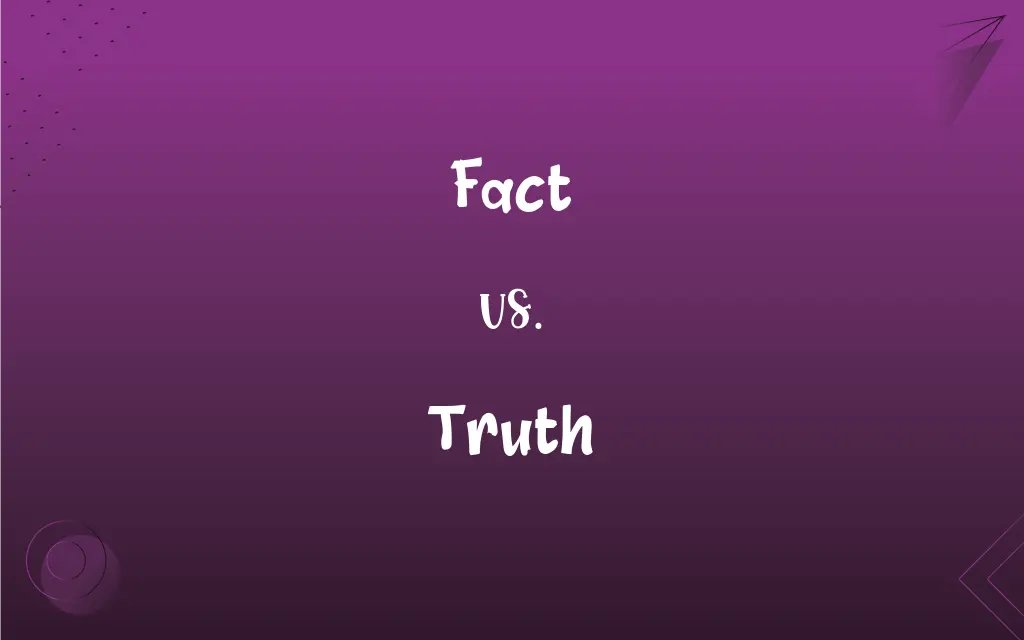Fact vs. Truth: What's the Difference?
Edited by Aimie Carlson || By Janet White || Published on December 9, 2023
A fact is an objective reality that can be proven, while truth is a concept that holds true based on evidence, belief, or perspective.

Key Differences
Fact refers to something that is empirically verifiable and universally accepted. Truth, on the other hand, can be subjective and varies based on individual beliefs and perspectives.
A fact is an objective piece of information, independent of interpretations or opinions. Truth, while based on facts, can be influenced by context, interpretation, and perception.
Facts are indisputable data or evidence, often used to support arguments or theories. Whereas, truths are conclusions or beliefs that are arrived at based on facts, but can still be debated or challenged.
Facts are concrete and unchanging, such as scientific data or historical events. Truths can evolve and change as new facts come to light or perspectives shift.
In the realm of science, facts are observable phenomena or established data. In philosophy or ethics, truths are often aligned with moral or ethical principles that are less tangible.
ADVERTISEMENT
Comparison Chart
Nature
Objective and empirical.
Subjective and perceptual.
Dependence
Stands alone as an independent entity.
Often relies on facts for foundation.
Changeability
Remains constant over time.
Can change with new interpretations or context.
Verification
Can be proven with evidence or data.
Can be accepted based on belief or perspective.
Field of Application
Common in science, law, and mathematics.
Explored in philosophy, ethics, and religion.
ADVERTISEMENT
Fact and Truth Definitions
Fact
An actual occurrence or a piece of true information.
It's a fact that Neil Armstrong was the first person to walk on the Moon.
Truth
The quality or state of being true.
She spoke her truth, even though it was difficult to hear.
Fact
Data or findings that are based on empirical evidence.
The fact that dinosaurs once roamed the Earth is supported by fossil evidence.
Truth
A statement or principle considered to be universally true.
Many philosophies seek to understand the fundamental truths of human existence.
Fact
A piece of information that is indisputably true.
It is a fact that water boils at 100 degrees Celsius at sea level.
Truth
An established or verified fact or principle.
The truth of the law of gravity is evident in everyday life.
Fact
A statement that is based on objective truth.
The fact that smoking is harmful to health is supported by medical research.
Truth
A concept or statement that is believed to be accurate or real.
The truth of her words was confirmed by subsequent events.
Fact
A reality that can be proven with evidence.
The fact that the Earth orbits the Sun was proven by astronomical observations.
Truth
A belief that is accepted as true by an individual or group.
To many, the truth of human-caused climate change is undeniable.
Fact
Knowledge or information based on real occurrences
An account based on fact.
A blur of fact and fancy.
Truth
Conformity to fact or actuality
Does this story have any truth?.
Truth
Reality; actuality
In truth, he was not qualified for the job.
FAQs
Can truths be subjective?
Yes, truths can vary based on individual or cultural perspectives.
Are historical events facts?
Yes, provided they are documented and verifiable.
Is truth always based on facts?
Often, but truths can also be based on beliefs and perspectives.
How is a fact proven?
Through empirical evidence, experimentation, or observable data.
Are all facts true?
Yes, by definition, facts are true.
Can a fact change over time?
No, a fact remains constant; only our understanding of it may change.
Can a belief be a truth?
Yes, beliefs can be considered truths to those who hold them.
How does perception affect truth?
Perception can shape how individuals interpret and accept truths.
Can truth vary between cultures?
Yes, cultural beliefs and values can influence what is considered truth.
Is a scientific theory a fact?
A theory is a well-substantiated explanation, but not a fact per se.
Can personal experiences be considered truth?
Yes, personal experiences can shape an individual's truth.
Is it possible for a fact to be untrue?
No, facts by their nature are true and verifiable.
Can truths be disproven?
Yes, truths can be reevaluated and challenged with new information.
Are mathematical statements facts?
Yes, if they are proven through logical deduction.
Is a fact always relevant?
Relevance can vary, but the fact itself remains true regardless.
Do facts depend on context?
Facts stand alone, independent of context.
How are facts established?
Through observation, measurement, and consistent evidence.
Can a truth ever become a fact?
A truth can be aligned with facts, but they are conceptually different.
Can truth be universal?
Some truths are considered universal, but others are more subjective.
Are all truths factual?
Not necessarily; some truths are based on beliefs without empirical evidence.
About Author
Written by
Janet WhiteJanet White has been an esteemed writer and blogger for Difference Wiki. Holding a Master's degree in Science and Medical Journalism from the prestigious Boston University, she has consistently demonstrated her expertise and passion for her field. When she's not immersed in her work, Janet relishes her time exercising, delving into a good book, and cherishing moments with friends and family.
Edited by
Aimie CarlsonAimie Carlson, holding a master's degree in English literature, is a fervent English language enthusiast. She lends her writing talents to Difference Wiki, a prominent website that specializes in comparisons, offering readers insightful analyses that both captivate and inform.






































































